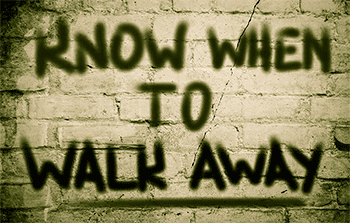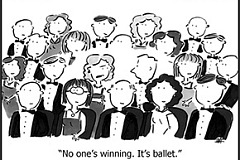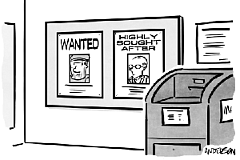 The Walk Away Law says: You never know the final price and terms until you get up and walk away.
The Walk Away Law says: You never know the final price and terms until you get up and walk away.
You may negotiate back and forth, haggling over the various details of the deal for a long time, but you never really know the best deal you can get until you make it clear that you are prepared to walk out of the negotiation completely.
When I was living in Mexico, I would often barter and buy things in the markets and bazaars. I found that you could go back and forth for a long time but that you never really knew how far down in price the seller would go until you shrugged your shoulders, thanked him for his time, and walked away. Once I had to walk an entire city block, without turning and looking back, before the owner of the store broke and came running after me and sold me the item at the final price that I had offered.
The first corollary of the “walk away” law says: “The power is on the side of the person who can walk away without flinching.”
[quotes]When you do walk out, always be pleasant, low-keyed and polite.[/quotes] Thank the other person for his time and consideration. Leave the door open so that you can enter back into the negotiation with no loss of face.
The second corollary of this law says: “Walking out of a negotiation is just another way of negotiating.”
Some of the very best negotiators, both nationally and internationally, are extremely adept at getting up and walking out. They will leave the room, the building, the city, and even the country if necessary, to strengthen their positions and increase their perceived power in a negotiation.
A common tactic, when teams are negotiating, is for one or more of the key players on one team to get up angrily, storm out of the room and vow never to come back. However, they will leave behind someone who will then seek for some way to make peace with his partners and bring them back into the discussion. The remaining party will be friendly and accommodating, as if he is really on the side of the other people. [quotesright]This tactic is very common in labor management negotiations.[/quotesright]
Another version of this is called, “good guy—bad guy.” In this version, there will be two negotiators, or interrogators in police investigations, one of whom will be hard and demanding while the other will be friendly and accommodating. One will be unreasonable and demanding while the “good guy” will try to make peace by getting you to concede a little to placate the “bad guy.” [quotes]It is all part of the game[/quotes] and you need to be aware of it in case anyone ever tries to use it on you.
How you can apply this law immediately:
- Be prepared to get up and walk out of a negotiation before you go in. Make sure everybody knows about this and when to do it. At the appropriate moment, you all stand up and head for the door. This will often completely confuse and disorient the other party or parties.
- Be prepared to cut off a negotiation the very minute you get an unacceptable offer or condition. Close up your briefcase, thank the other person for their time and head for the door. The better you get at this, the better deals you will get.
- from "THE 100 ABSOLUTELY UNBREAKABLE LAWS OF BUSINESS SUCCESS" – Brian Tracy














